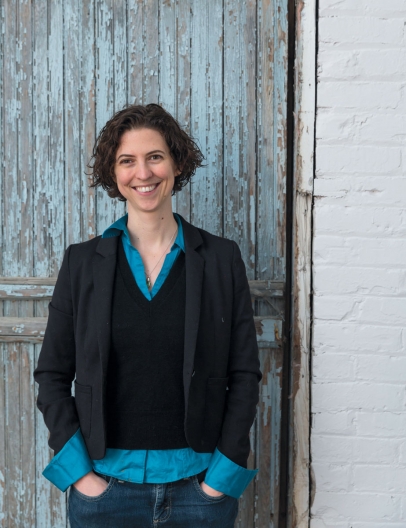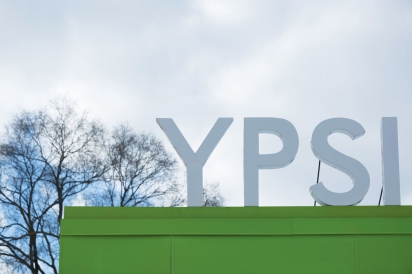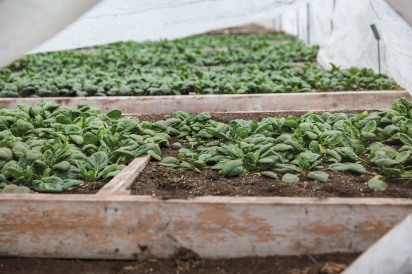Meet Amanda Edmonds: Mayor of Ypsilanti and Local Food Champion
On a January afternoon, Amanda Edmonds is enjoying a rare moment of quiet. Shaking off the cold, she steps inside a drive-thru bank turned garden resource store called Ypsiplanti. The building’s vibrant green facade stands like a beacon along this gray, neglected stretch of South Washington in downtown Ypsilanti.
Most of the time, Edmonds is running from meeting to meeting, juggling the many facets of Growing Hope, the local food advocacy nonprofit she launched in 2003. The organization has grown from a single youth garden at Ypsilanti’s Perry Child Development Center to include community education programs, Ypsiplanti, a nascent food district, a farmers’ market, policy advocacy and more. The ultimate goal is improving healthy food access for the Ypsilanti community.
Add all to that her duties as mayor of the City of Ypsilanti, a post she was elected to in November 2014, and it’s a wonder how Edmonds has enough energy to keep up with it all. “I sleep eight hours a night,” she says with a laugh. “That’s how. It’s the one thing I have to do.”
These days, Edmonds is focused on launching the Ypsilanti Farmers MarketPlace, which will create a permanent year-round, indoor-outdoor farmers’ market in the city. The project aims to spark a vibrant food district in a disinvested area of downtown Ypsilanti. It’s composed of two adjoining parcels: One houses an old warehouse that’s being converted into the indoor market, while the other houses Ypsiplanti and space for the outdoor market.
The project got a boost in 2015 from the Michigan Economic Development Corporation’s Public Spaces Community Places program, which gives projects an opportunity to crowdfund through the Patronicity online platform. Growing Hope raised $86,600 in funds through the platform, which leveraged a $65,000 matching grant from MEDC.
Despite this cash infusion, more work and more funds are needed to get the indoor market structure built out. The space, once completed, will also house a small incubator kitchen. “We know that’s still a big need for local entrepreneurs,” says Edmonds. “We are so eager to get it finished.”
Edmonds believes event rentals will round out the space and help provide revenue to recover costs for community-based activities. “We’ve heard from event planners and tourism people, ‘Oh, my goodness. We can’t wait for this space to be open,’” she says. “We’ve had people look at it for weddings already.”
But while Edmonds may be eager to get the market district under way, it’s by no means the only thing on her plate. Growing Hope seems to have a finger in just about every pie related to food access in the Ypsilanti area.
For example, Edmonds is working to implement farm-to-school programs in partnership with Ypsilanti Community Schools. Her goal is to help build the pipeline of local growers and producers by helping them to comply with the requirements of school food service providers like Chartwells.
“That’s why we’re focusing some of our business development classes this year on how to scale up, so that we have more of the supply chain that is ready,” says Edmonds. “Our growing community doesn’t yet have enough capacity to work at the scale and with the kind of things they need.”
At the same time, she’s casting an eye on corner party stores, like the one right next to Ypsiplanti, which serves the local neighborhood but offers little or nothing in the way of healthy food options. “We’re trying to figure out how best to help get healthier food into the corner stores,” she says. “Within the city limits, we don’t have a full-service grocery store at all.”
She’s also working to engage those in the Ypsilanti community in growing their own food. Growing Hope works with more than 700 mostly low-income individuals each year in after-school programs, summer programs, school settings and at community sites through field trips or on the organization’s demonstration urban farm.
For Edmonds, there’s endless possibility and need for her organization’s work. She’s come to rely on her gut to help her figure out where to best allocate resources.
“It’s because we have a systems approach,” she says. “It’s about not necessarily working with an individual, but about the community and the environment and the policies. It’s about a lot of those different levels and how they all intersect. Since that’s our theory of change, it’s our belief that we need to work on these multiple levels.”
Fortunately, Growing Hope has strong collaborators in Washtenaw County. Edmonds points to the county health department and MSU Extension as key resources. At the state level, she extols the benefits of MSU’s Center for Regional Food Systems and their Good Food Charter, which has helped set a direction for sustainable food system activities across Michigan.
“MSU has created an amazing culture with their networks,” says Edmonds. “There’s a farm-to-institution network. There’s a Michigan food hub network. There’s now a Michigan kitchen incubator network. We’re part of all of those. They’ve created such a great shared learning environment.”
And it’s through that shared learning that Edmonds hopes a real difference can be made for the kids she started working with more than a decade ago in the Perry Child Development Center. She knows that any effort to expose kids to healthy food options in an after-school program will be for naught if the rest of the child’s environment doesn’t support those options.
“So we work with kids on the individual level, and we work with schools and food service to improve kids’ access to good food. We say ‘Hey, here’s our best practice. Let us share it with you.’”
Find out more at Growing Hope








